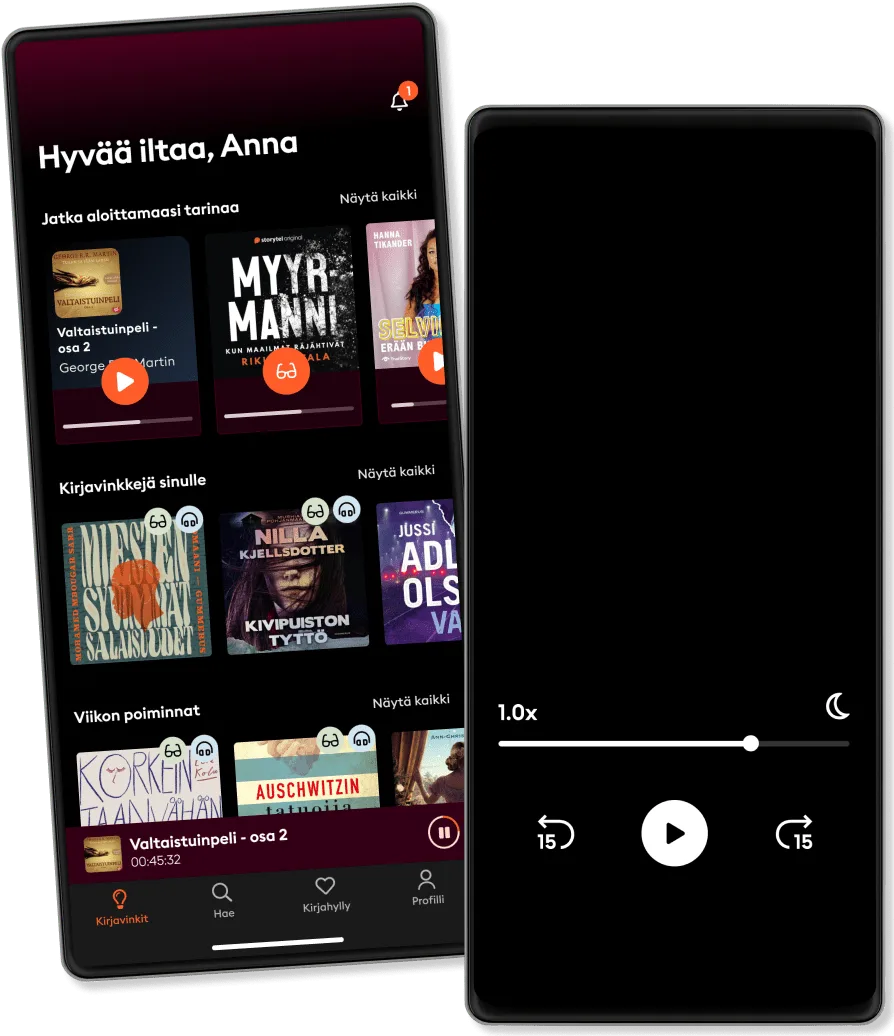Kuuntele missä ja milloin haluat
Astu tarinoiden maailmaan
- Pohjoismaiden suosituin ääni- ja e-kirjapalvelu
- Uppoudu suureen valikoimaan äänikirjoja, e-kirjoja ja podcasteja
- Storytel Original -sisältöjä yksinoikeudella
- Ei sitoutumisaikaa

Yoruba shamanism
- Kirjailija
- Kustantaja
- Kieli
- Englanti
- Format
- Kategoria
Henkinen kasvu
The striking resemblance which the Yoruba religious system bears to that of the ancient Greeks can scarcely have escaped notice. Olorun, the sky-god proper, now being gradually displaced by the more anthropomorphic Obatala, resembles Uranus, who was displaced by Kronos. In Greek mythology Kronos married his sister Rhea, the earth, and the Yoruba myth makes Obatala marry Odudua, who also represents the earth, though the qualities of Aphrodite appear to predominate. Olokun answers to Poseidon, Ogun, worker in iron, to Hepoestus, Orisha Oko to Priapus, Osanhin to Aesklepius, Orun, the sun, to Helios, and Oshu, the moon, to Selene. Zeus' messenger, Hermes, the lightning, was the protector of plunderers, and Shango is the god of lightning and plunder. Ifa, as the, god of prophecy, and the being who wards off evil and affords help, resembles Apollo, who, in Homer, is perfectly distinct from the sun-god, though identified with him in later times.
The spirits of the trees answer to the Hama-dryads, and we have river-gods and sea-spirits. Metamorphosis to a brook, spring, or lagoon is common, and we have one example of a girl, being transformed, like Daphne, into a shrub. The gods, when consulted, gave oracular responses that differ in no essential particular from the answers given by the Oracle of Delphi. The Yorubas, like the Greeks, offer human sacrifices in time of national need. Dancing was, with the Greeks, intimately connected with worship, as Lucian says: "You cannot find a single ancient mystery in which there is not dancing;" and by the Yoruba every god of note has his own dance, which is sacred to him, and known only to the initiated.
© 2018 Books on Demand (E-kirja): 9783748129042
Julkaisupäivä
E-kirja: 22. lokakuuta 2018
Avainsanat
Saattaisit pitää myös näistä
- Magic of the Celtic Otherworld: Irish History, Lore & Rituals Steve Blamires
- Yoruba: The Ultimate Guide to Ifa Spirituality, Isese, Odu, Orishas, Santeria, and More Mari Silva
- Rosicrucian Doctrines and Tenets Manly Palmer Hall
- The Occult Anatomy of Man Manly P. Hall
- Spirit Voices: The Mysteries and Magic of North Asian Shamanism David Shi
- Isis The Virgin of the World Manly Palmer Hall
- Ifá: The Ultimate Guide to a System of Divination and Religion of the Yoruba People Mari Silva
- Magickal Astrology: Use the Power of the Planets to Create an Enchanted Life Skye Alexander
- The Secrets of Alchemy Lawrence M. Principe
- The Kybalion: A Study of Hermetic Philosophy of Ancient Egypt and Greece The Three Initiates
- Topi Kale Puonti
4.3
- Rakel Satu Rämö
4.1
- Cannonball MC: 20 vuotta jengissä Sami Lotila
3.2
- Punainen verkko Aamos Honka
4.4
- Särkyneet: Tarinoita kadun varjoisalta puolelta Jarkko Stenius
3.6
- Sara Sieppi: Oliks sulla vielä jotain? Wilma Ruohisto
4.5
- Lehmä synnyttää yöllä Pajtim Statovci
4
- Kotiapulainen valvoo Freida McFadden
3.9
- Pakastaa, ei pakasta Katariina Harteela
3.8
- Mirabilis Anni Kytömäki
4.1
- Sysimusta kuilu Lilja Sigurdardóttir
3.9
- Ultraprosessoitua: Miksi syömme ruokaa, joka ei ole ruokaa, ja miten se meihin vaikuttaa? Chris van Tulleken
4.5
- Heikki Silvennoinen: Nousut ja laskut Tommi Saarela
4.2
- Rautaliekki: Empyreum 2 Rebecca Yarros
4.4
- Tyttöjen ilta – Tove Tönniesin murha
3.5
Valitse tilausmalli
Yli miljoona tarinaa
Suosituksia juuri sinulle
Uusia Storytel Originals + eksklusiivisia sisältöjä kuukausittain
Turvallinen Kids Mode
Ei sitoutumisaikaa
Standard
Sinulle joka kuuntelet säännöllisesti.
1 käyttäjätili
50 tuntia/kuukausi
Ei sitoutumisaikaa
Premium
Sinulle joka kuuntelet ja luet usein.
1 käyttäjätili
100 tuntia/kuukausi
Ei sitoutumisaikaa
Unlimited
Sinulle joka haluat rajattomasti tarinoita.
1 käyttäjätili
Kuuntele ja lue rajattomasti
Ei sitoutumisaikaa
Family
Kun haluat jakaa tarinoita perheen kanssa.
2-6 tiliä
100 tuntia/kk jokaiselle käyttäjälle
Ei sitoutumisaikaa
2 käyttäjätiliä
26.99 € /kuukausiFlex
Sinulle joka kuuntelet vähemmän.
1 käyttäjätili
20 tuntia/kuukausi
Säästä käyttämättömät tunnit, max 20h
Ei sitoutumisaikaa
Suomi
Suomi